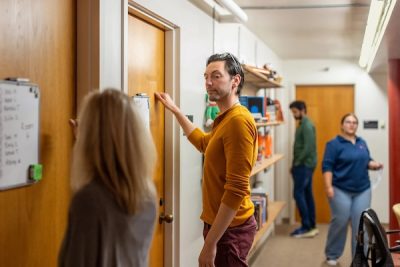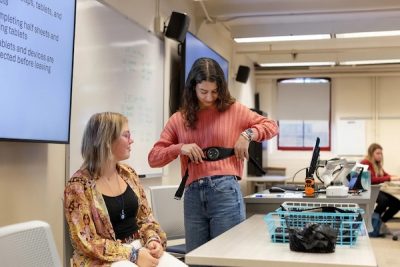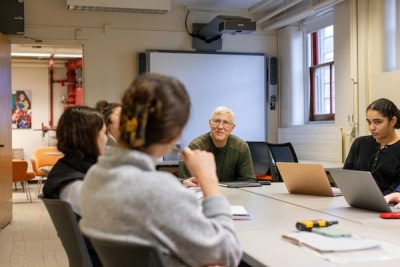Carly Svec ’27 just experienced a grueling parent-teacher conference. A student’s father raised serious concerns about his daughter’s change in behavior and feared she may harm herself. That raised a red flag for Svec, who realized the need to set an intervention in motion. “There are so many curveballs that can be thrown at you in a parent-teacher conference and knowing how to approach it and be prepared is so important,” Svec says.

In reality, Svec had just completed a simulation. She is an inclusive childhood education major taking Clinical Simulations in K-12 Teacher Preparation (EDU 106), a foundational course in the Syracuse University School of Education that introduces students to a range of increasingly formidable real-life teaching scenarios through six clinical simulations (SIMs). In each simulation, students interact with actors—known as standardized individuals—who play a variety of roles that incorporate issues such as bullying, confrontational parents and colleagues, and climate change. As an integral part of the school’s curriculum, SIMs introduce more subject-specific interactions as teaching candidates progress through their studies.
“Every simulation is meant to be an educative challenge, because from the very start they’re going into a really complex human-helping profession in a K-12 school environment,” says Professor Ben Dotger, director of the Center for Experiential Pedagogy and Practice (CEPP). “We get into the nitty-gritty of what it is to be a teacher in the real classroom and the real school.”
Expanding the Reach of Simulations
Aware that SIMs are a common training practice at medical schools, Dotger applied the idea to teacher preparation and introduced SIMs at the School of Education 18 years ago, partnering with SUNY Upstate Medical University, which shared access to its actors and simulation facility. “I knew early on that we had stumbled into a way of getting students excited about and attuned to serious content—if I could put them in a simulation first,” Dotger says.

Today, CEPP has a dedicated space in Huntington Hall that features six simulation rooms equipped with cameras and microphones and a monitoring room where student-actor interactions are observed and recorded. Dotger works with a team of undergraduate and graduate assistants who help organize and run the SIMs. All told, CEPP has a catalog of 114 SIMs. Along with ones for teacher preparation and specific subject matter, the center offers SIM training for school leaders, student veterans, creative arts therapy students and finance and management majors whose SIM challenges them with ethical situations.
“The platform gives you enormous flexibility to situate a learner and a standardized individual community member, client—you name it,” says Dotger, who continues to grow the program through outreach to different groups and disciplines. “My job is to think who could benefit from SIMs and then get colleagues to partner with me.”
An Exercise Science Collaboration
“I knew early on that we had stumbled into a way of getting students excited about and attuned to serious content—if I could put them in a simulation first.”
Professor Ben Dotger
On a Monday morning during the fall semester, some EDU 106 students are outfitted with sensors strapped around their chests and arms that record their heart and breathing rates, heart rate variability, movement and other physiological information. During the SIMs, Tiago Barreira, an exercise science professor in the David B. Falk College of Sport and Human Dynamics, and students in the course Simulation Physiological Data Science (EXE 300) view a large monitor that displays feedback in real time as SIMs play out in six rooms at the center.

The course was created three years ago with the support of a National Science Foundation grant that focuses on STEM education and communication. Pairing it with the SIM course gives the students real-time experience in collecting physiological data, analyzing it and communicating the results to the SIM students. “The data communication piece is key,” Barreira says. “The students not only get into research, but the main thing is learning how to communicate what the data means.”
EXE 300 student Isabel Alfonso ’24, a sport analytics major, and EDU 106 student Eli Burke ’26, an inclusive adolescent education and history major, found the communication interaction both nerve-racking and informative. “Obviously we’re all nervous in the simulation, and it’s cool to actually have data with time stamps that show where your heart rate spikes,” Burke says.
Lindsey Matthews ’25, a health and exercise science major, values the opportunity to conduct research and communicate the results face to face. “It’s a great communication experience because we’re learning how to communicate this data—I’m not just sending an email and telling you what it could mean,” she says. “You have to be able to facilitate a conversation with this person to communicate the data as well.”
Review and Reflection
After completing their SIMs, the students meet in groups with teaching and curriculum doctoral student Julie Harnett ’18, G’19, a CEPP graduate assistant who leads them through a debriefing.
“I love the class. The interactions are serious, and it’s helpful to have that pressure when you’re going into a simulation.”
Sophia Angelini ’28
Harnett, a former math teacher in the Syracuse City School District, asks questions, draws out important points and provides guidance on interacting with parents and how to handle a situation that involves mandatory reporting. “I love the class,” says Sophia Angelini ’28, an inclusive childhood education major. “The interactions are serious, and it’s helpful to have that pressure when you’re going into a simulation.”
Dotger calls the students’ shared experience—which includes class discussions and presentations of their SIMs performances—the “biggest community builder I’ve ever seen.” He wants them to collaborate, learn from one another and prepare themselves for their teaching careers.
“You need to understand what it feels like when you’re having a serious professional conversation,” he says. “Understand that you’re not going to have all the skills from the very start, but you’ll learn them as you go and have chances to implement them in the next interactions.”
